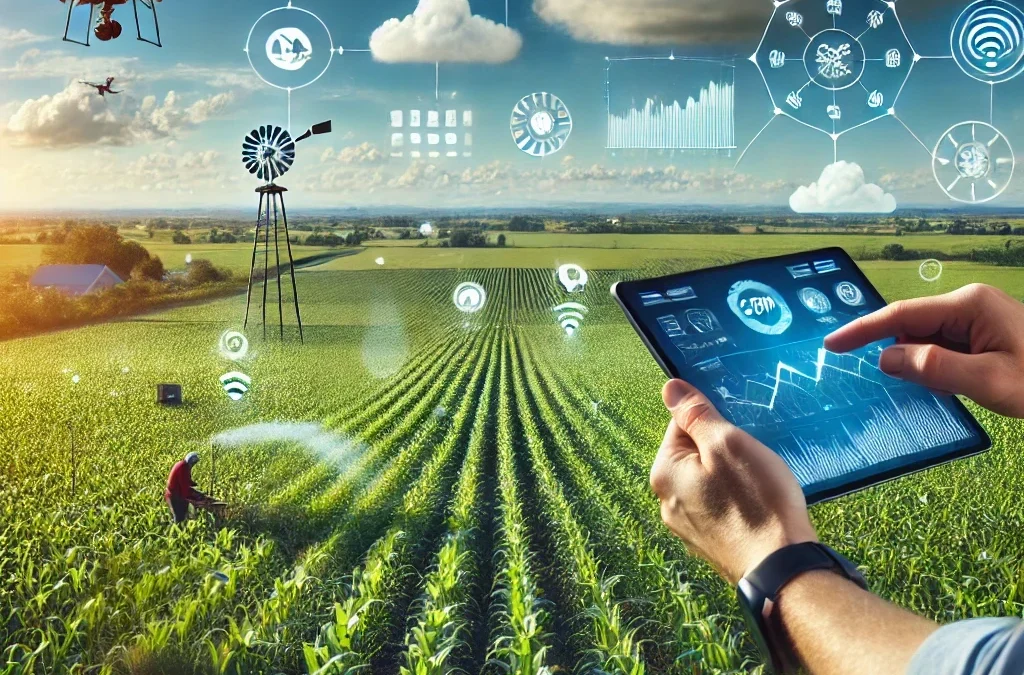The agricultural industry is at a critical juncture as it faces the growing impact of climate change and the need to leverage AgTech for climate-resilient farming. Traditional farming methods are increasingly challenged by unpredictable weather patterns, soil degradation, and water scarcity. In response, Artificial Intelligence (AI)-powered AgTech innovations and wireless technology have become essential tools for building climate resilience into farming operations.
The Role of AI in Climate-Resilient Agriculture
AI’s capabilities extend beyond just optimizing farm operations; it plays a pivotal role in making farming more adaptable to changing climates. AI algorithms can process vast amounts of data from various sources—weather forecasts, satellite imagery, soil conditions, and crop health indicators—to offer predictive insights. These insights help farmers anticipate and prepare for adverse weather conditions, optimize planting schedules, and manage resources like water and fertilizers more efficiently.
For example, AI-driven models can predict the likelihood of droughts or floods, enabling farmers to take proactive measures to protect their crops. By analyzing historical weather data and current climate trends, AI can suggest the best times for planting and harvesting, thus maximizing yields while minimizing risks. Furthermore, AI can also help in identifying the most suitable crop varieties for specific climatic conditions, ensuring that farms remain productive even as environmental conditions evolve.
Wireless Technology: The Backbone of Real-Time Farm Management
Wireless technology complements AI by providing the necessary infrastructure for real-time data collection and remote farm management. Wireless sensors placed throughout the farm collect continuous data on soil moisture, temperature, humidity, and other critical parameters. This data is transmitted to central systems where it can be analyzed and acted upon.
The real-time nature of wireless technology allows for immediate adjustments in farm operations. For instance, if soil moisture levels drop below a certain threshold, the system can automatically trigger irrigation, ensuring that crops receive water precisely when needed. This not only conserves water but also helps in maintaining optimal growing conditions, which is crucial in the face of erratic weather patterns.
Wireless technology also enables farmers to manage their operations remotely. Whether it’s adjusting irrigation schedules, monitoring crop health, or tracking weather changes, farmers can make informed decisions without needing to be physically present on the farm. This level of control is invaluable in reducing the vulnerability of farms to climate-related disruptions.
How AgriLynk Supports Climate-Resilient Farming
While AI and wireless technology represent the cutting edge of AgTech, AgriLynk provides a practical, data-driven solution specifically designed to enhance farm resilience. AgriLynk’s platform utilizes a robust database of optimal soil conditions, developed by agricultural experts and informed by extensive research from universities and government agencies. This expert-driven data is the backbone of AgriLynk’s automated systems, ensuring that farmers receive accurate and actionable recommendations.
AgriLynk’s wireless sensors collect real-time data on soil moisture, temperature, and other critical parameters, transmitting this information to a central dashboard accessible from any online device. Unlike AI systems that predict outcomes, AgriLynk focuses on providing reliable, real-time data that enables farmers to respond immediately to current conditions. This is particularly important in climate-resilient farming, where timely decisions can mean the difference between a successful harvest and a failed crop.
For example, AgriLynk’s system can automatically adjust irrigation based on real-time soil moisture readings, ensuring that crops receive the optimal amount of water. This automated response not only conserves water—a critical resource in many regions—but also helps maintain consistent crop health despite fluctuating weather conditions. Moreover, because AgriLynk is designed to be scalable, it can be easily adapted to farms of any size, providing tailored solutions that grow with the farm’s needs.
In addition to its real-time capabilities, AgriLynk offers the flexibility to incorporate data from a wide range of sensors and equipment. This allows farmers to build a customized system that meets their specific needs, whether it’s monitoring soil conditions, managing irrigation, or tracking weather patterns. By leveraging trusted data and reliable technology, AgriLynk helps farmers implement practices that are both sustainable and resilient, ultimately leading to more stable and productive farming operations.
Conclusion
As climate change continues to pose significant challenges to agriculture, the integration of AI and wireless technology offers powerful tools for building resilience, allowing us to leverage AgTech for climate-resilient farming. While AI provides predictive insights and optimization, wireless technology ensures real-time responsiveness and control. AgriLynk complements these advancements by offering a data-driven, expert-informed platform that empowers farmers to make informed decisions based on reliable, real-time data. Together, these technologies enable farmers to adapt to the challenges of a changing climate, ensuring the long-term sustainability and success of their operations.








